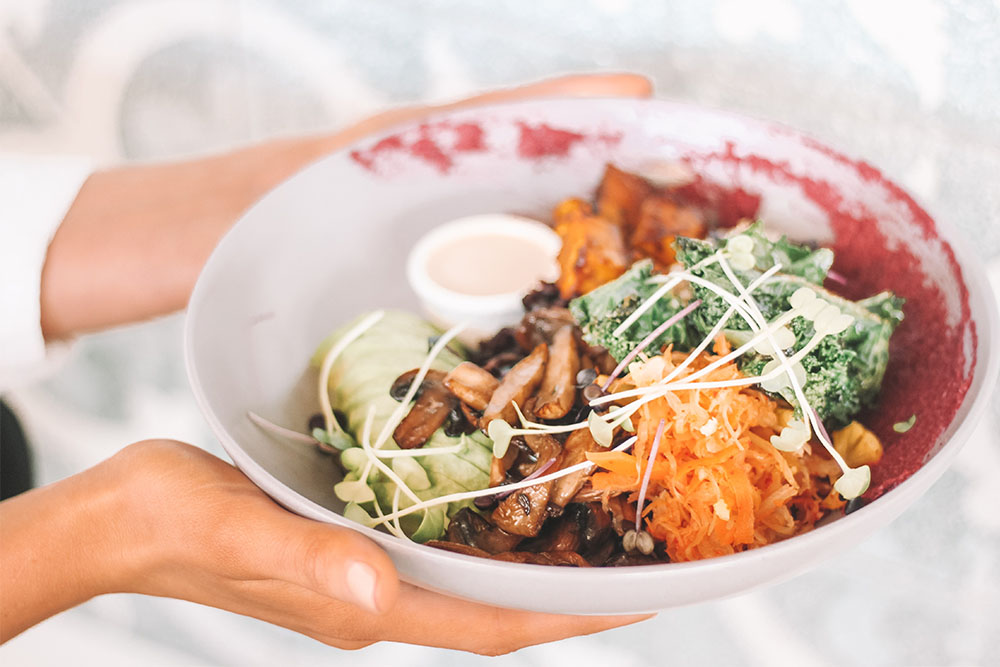Health Challenges and Cleanses – A Help or Hinder?

Gillian White – MSc, PhD (Candidate), University of Toronto
Health Challenges and Cleanses – Helping or hindering for your resolutions. A personal account.
I will start by saying that I am not the type of person to do cleanses, or really any particular diet for that matter. Generally speaking, I do the eat well as much as possible (i.e. real, whole foods – regardless of fat or carb content) but treat yo’self because you can (and cuz I love dem French fries). And fortunately, I like exercise a lot so I’m able to offset the alarming amount that I “treat ma’self”. So although this is out of character, I’ve started a “health challenge” this week that is put on by my friend’s gym, SXS fitness in Toronto, Canada.
The rules are:
No added sugar (>3g of sugar per serving)
No grain (week 1), no dairy (week 2), no alcohol (week 3). Your choice (week 4)
Min. 6 servings of vegetables
Min. 10 glasses of water
4-5 workouts/week (high intensity strength/metabolic)
Daily Challenge (plank, burpees, yoga series, educational)
Lifestyle/Self-care (make your lunch, >7h of sleep etc.)
This challenge is pretty reasonable but there is certainly not a lot of room to treat ma’self. Which got me thinking – are these sort of rigid, or sometimes extreme health challenges beneficial for making positive changes in your life, or are they dooming you to long-term failure?
Related Article: 16-Week Training Program to Help Promote Health
Let’s debate:
PRO’s
I think the advantages to these kind of things derive from the rigidness of the main “rules”, the structure of having rules at all, the competitive element, and the tracking component. The rigidness of the main rules and the fact that they’re more restrictive than I would place on myself (i.e. no grains) has forced me to be more inventive with my meals. This is I think one of the most important long-term gains of these types of challenges: being forced out of your culinary comfort zone to look for other options instead of your rote Monday to Friday menu.
The cut and dry rules also make you accountable to what you’re eating. There’s no grey area with them so you can’t make excuses. This is actually exploiting how your brain works and is part of the rationale behind SMART goals (Specific, Measurable, Adjustable, Realistic, Time-bound). If you wanted to “run more”, this is not as instructive as saying “I want to run 3 times a week for at least 30 minutes each time”. When your brain has instructions without wiggle room, it knows how to plan to achieve those instructions. And when you brain executes a plan that it has set out to, you get a shot of happy juice (not wheatgrass, dopamine!).
I’m an overly competitive person and when I started this challenge (yesterday…), I started with a text to my friend saying “I signed up and I’m winning this”. For me, it’s easy enough to say I’ll eat better or try to eat less sugar, but because I’m generally pretty healthy, there’s no sense of urgency or added impetus to make me do it. But tell me, “whoever can cut added sugar for 4 weeks the most consistently”, I’m like “*record scratch – dumps chocolate milk on the floor* YOU’RE ON!”.
Related Article: Staying In Shape For The Long Haul
Lastly, if there’s an imbedded tracking platform, it allows you to track your progress (duh!), which also helps keep you motivated (thanks again, dopamine!). I’m not one to count calories or even time my runs but I have found a massive sense of satisfaction when I enter my numbers and check my boxes for the day. It actually makes me excited for the next day to not eat grains again! I genuinely was not anticipating how excited I would get to log my progress.
CON’s
I’ll actually use the same themes as the Pro’s list but from a negative perspective. The restriction of food types can really be taken overboard. While I’m not concerned for myself that this would lead to any disordered type of eating, I can see how in the wrong frame of mind it could get out of hand. As well, although this is more restrictive than my normal diet, it’s not like I’m going from eating fast food and Kraft Dinner every night to eating only whole foods that I’ve prepared myself. I think for some people this might be too much of a leap – with that said, the organizers actually have a shopping list and a bunch of recipes to help newbies out so they do a lot to set everyone up for success.
As far as potential downsides of the structure, it really just precludes you from being spontaneous in your food choices and maybe a bit anti-social (I was invited to a friend’s to make pizza and am really struggling with how to do that and not lose points – like I said, I’m very competitive). I do think that this is the best way to train yourself to take on a new habit – commitment is key to making changes and it’s made a whole lot easier when the rules are black and white. So I think this is probably a point for the Pro’s column but in the long-term I would imagine that I’ll resume (to a lesser extent) my more lenient ways, for the sake of socializing once I’ve won this challenge. I mean once it’s over.
Related Article: Get Motivated To Exercise: Rats Do It, You Can Too
There is no downside to the competitive element. Just kidding! Sort of. The only possible downside that I see may be for people who are solely motivated by the competition but not winning finding that they’ve lost motivation but I think for the most part people are intrinsically motivated to make these lifestyle changes and are using this forum to keep themselves accountable. There also may be a possibility for people to take this too far, but you don’t get extra points for excessively following rules – it’s really more of a binary “did you eat grains, yes or no” and you do get partial points for the categories that have a “eat/drink a minimum of ___”.
Finally, the tracking of progress – I think the biggest danger is if one were to take it upon themselves to also track weight or calories or something else that may parlay into something resembling disordered eating. With that said, everything that you get points for and that is tracked in the platform for the challenge that I’m doing is behaviour based, not outcome based. So it reinforces the process, which is an important aspect of making positive lifestyle changes.
Related Article: Think Positive Thoughts For A Better Workout
VERDICT:
So I think overall, I’m much in favour of the PRO’s of this little experiment I’m conducting but talk to me in three weeks when I haven’t had a single potato chip and I might be singing a different tune!
Disclaimer: this is purely my experience and my opinion. It’s based on my how I’ve felt about making these changes and what I know about physiology, nutrition, cognitive behaviour, and healthy living. This is not a prescription or an endorsement, it’s simply my interpretation.
You Might Like:

















